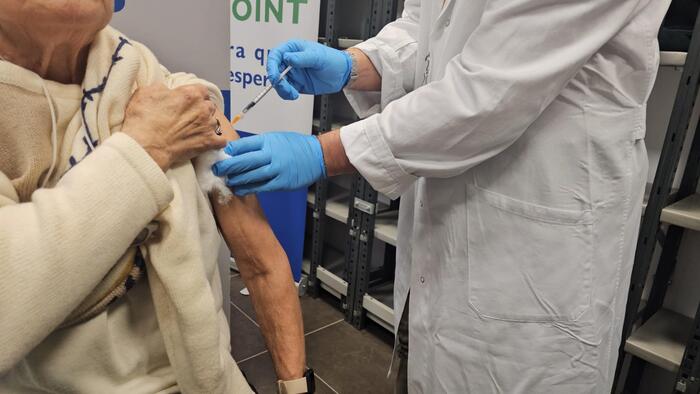Mandatory vaccination is a melon that any democratic government would prefer not to open. When immunization against COVID began late last year, the enthusiasm for inoculation among the majority of the population was proportional to the shortage of doses, and authorities were more concerned that crooks did not sneak in to those who did not belong to the turn that for forcing the injection to anyone. But as more citizens are pricked, more and more roads arrive and a more contagious variant spreads, some Western countries are already looking for incentives, when they do not impose the vaccine on certain groups, on pain of losing their jobs. Italy has taken another step this week. His prime minister, Mario Draghi, assured on Thursday that he will study forcing his population to be vaccinated when the situation allows it,which would make his country the first democracy to do so.
No other, at the moment, has taken the step of making vaccination against the coronavirus mandatory for all citizens. But 21 countries of the European Union require the covid certificate to access concerts, shows, sporting events, weddings, bars or swimming pools. In Spain, four communities (Galicia, Andalusia, Cantabria and the Canary Islands) have tried to open this path, but their higher courts of justice have considered that proof of vaccination cannot be used as a safe-conduct and have had to reverse it. Other countries go further: in Italy immunization is already compulsory for health workers and teachers and in France all their essential personnel in contact with the public have to be vaccinated if they do not want their salary to be withdrawn.
In the United States, vaccination rates rose again after successive States were imposing the obligation of the vaccine for public workers and prohibiting access to more and more public and leisure spaces to people who decide not to inoculate themselves, according to
The New York Times
.
More information
Italy opens the door to mandatory vaccination against coronavirus
Neither incentives nor mandatory vaccination are a new or exclusive debate on this pandemic.
In fact, according to the Vaccine Advisory Committee of the Spanish Pediatric Society, in 11 countries of the European Union at least one is mandatory for children under 18 months.
They are Italy, Latvia, Bulgaria, Croatia, Slovakia, France, Hungary, Poland, the Czech Republic, Greece, and Belgium.
The discussion has three sides: on the one hand, the legal reserve, something that can always be changed at the will of the rulers;
on the other, if it is ethical and, finally, if it is convenient.
To the latter, Mohammad Sharif Razai, from the St. George's Population Health Research Institute, University of London, responds that it tends to be rather counterproductive: “Evidence shows that mandatory vaccination will likely increase vaccine rejection. and non-compliance with non-pharmacological interventions such as physical distancing, the use of masks and other measures ”.
"Evidence shows that mandatory vaccination will likely increase vaccine rejection"
With regard to ethics, Sharif, who has written about the factors that can influence people when it comes to accepting vaccines, also sees problems: “The so-called herd immunity thresholds are important, but we don't know what percentage of the population you must be vaccinated to reach the threshold. In general, in most countries the rejection of vaccines is lower, for example, in the United Kingdom it is less than 7% of the population ”. In Spain it stands at 4%, according to the latest survey by the Spanish Foundation for Science and Technology.
This is the main reason given by the experts in public health and bioethics consulted by EL PAÍS to reject, today, the mandatory nature of vaccination. “At this time, when adherence to vaccination is so high, it is better not to move what has worked. But in this pandemic, nothing can be thrown away either. Although I do not think that forcing vaccination is an urgent element of the debate now, "says Amós García Rojas, president of the Spanish Association of Vaccination.
In Spain, the question focuses on something that is already being done in other countries and at least five autonomous communities, in addition to the employers of the residences, are asking: that the vaccine be mandatory at least for workers in social health centers, which are in contact with vulnerable people. A survey published by the Appinio consultancy in Spain among 1,000 participants who responded through its application shows that 67% of those questioned are in favor of mandatory vaccination in groups that deal with especially vulnerable people such as health personnel.
Here is an
a priori
more guarantee
option
, proposed by the technicians of the Interterritorial Council of the National Health System: to test those who refuse to inoculate themselves twice a week and assess their transfer of position. Although it is legal and on paper, it presents a logistical problem: in the residences, according to the employers' complaints, they have no other tasks to give to those who have been expressly hired to care for the elderly.
Ultimately, the judges will have to resolve everything from labor disputes caused by the vaccine to whether it is legal to request a vaccination certificate to enter an establishment. "The courts are knocking down these measures in Spain because they do not see them proportional," says Nuria Amarilla, from the Association of Health Lawyers. “We have a law of special measures of Public Health that allows a wide margin of action, which is positive to be able to interpret it according to the context. There are times when the laws want to be very specific and then they do not contemplate exactly what happens in real life ”, he emphasizes. With this law in hand, a magistrate authorized the forced vaccination of children whose parents refused to be pricked against measles after an outbreak in Granada. It was in 2010,in a very particular context with characteristics very different from that of the covid pandemic.
"We have a law of special measures of Public Health that allows a wide margin of action"
Experts advocate persuading rather than compelling.
The staunch anti-vaccines have some weight in countries like France and the United States, but even there they are still a very minority.
In Spain they are irrelevant.
It will be almost impossible to convince them, but there is a possibility of changing their minds to the doubtful, says David Robson, author of the book
The Intelligence Trap: Why Smart People Do Nonsense
, in a BBC article
.
It advocates listening instead of imposing, being respectful of the opinions and fears of others and trying to establish a dialogue, rather than a speech.
Robson explains the theory of the five Cs, postulated before the pandemic.
It is a psychological model that establishes five factors that influence people's decision-making regarding health and that can be worked on to decline the greatest number of people on the vaccination side of the balance.
They are trust (in the safety of vaccines, politicians ...), complacency (if a person considers that their health is at risk), calculation (cost-benefit), convenience (the ability to access the vaccine) and collective responsibility (the will to protect others from infection).
Protect or protect yourself?
Vaccination for any disease, whether compulsory or voluntary, has basically two objectives: to protect the individual who takes it so as not to become ill, or / and to protect society with the so-called herd immunity, which is based on the fact that if a large percentage of the population is immunized, the pathogen no longer has a place to circulate and ends up disappearing. The percentage of people needed to reach this threshold depends on two factors: the effectiveness of the vaccines to prevent infection and the infectivity of the virus. If at the beginning of the pandemic it was thought that with good drugs it could be achieved with 70% of the immunized population, the delta variant today has triggered this figure, which is surely over 90%, if it can be achieved with current vaccines.
Íñigo de Miguel Beriain, researcher at the University of the Basque Country, expert in Bioethics, doctor in Law and Philosophy, affirms that if it were decided to make the vaccination compulsory, it would be necessary to explain very well which of these two objectives is being pursued and to have reliable data that endorse the decision. "The obligation may be ethical, but with many conditions," he says. “If it is to protect the citizens who inoculate it, as is the case with the seat belt, it will be necessary to be very sure that the risk-benefit is favorable for all people who receive the vaccine by mandate. For the vast majority it will be, but this is less clear as age decreases and is unknown in children, for whom a drug has not yet been approved, ”he reasons.
It is precisely this argument that Federico de Montalvo, president of the Spanish Bioethics Committee, uses to defend that the debate on the obligation will have to come in the not too distant future. In Spain there is 11% of the population under 12 years of age. For them there is still no prophylaxis and the risks of becoming seriously ill or dying are so miniscule that no matter how safe the vaccine is on the day it is approved, a tiny percentage of serious side effects would already place the risks above the benefits. "If we are going to vaccinate them to achieve group immunity, perhaps we should ask ourselves if it is not more ethical to forcibly vaccinate the elderly who do not want to," he says. Beriain also questions the obligation to achieve group immunity: “On the one hand, it is not known where it is. For another,vaccines are not 100% sterilizing. There are other less invasive measures of rights that can give good results to protect the rest of the population, such as requesting vaccination certificates for certain activities ”.







/cloudfront-eu-central-1.images.arcpublishing.com/prisa/PCE7NMB26ZDVRIQX2R26JSNH6A.jpg)






/cloudfront-eu-central-1.images.arcpublishing.com/prisa/IGZ7GOCXZ5GUPAQ2HWGK6Z76BU.jpg)